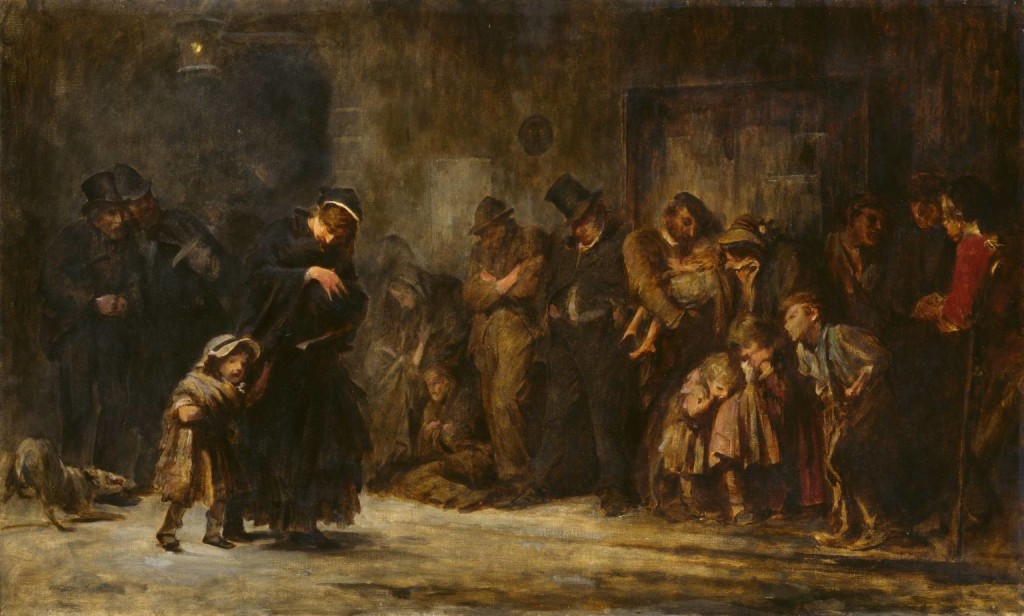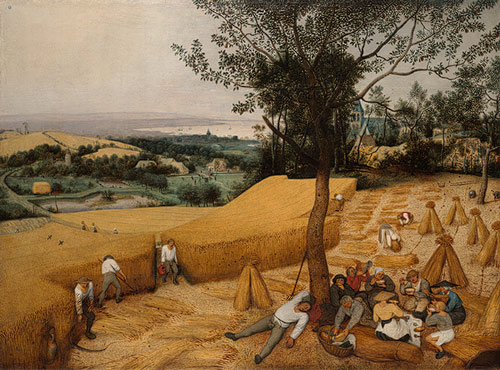Do people starve simply because there are too many of us? Is famine the necessary companion of civilization? Was parson Malthus right in his grim insistence that population must necessarily outdistance food supply? Or, even worse, are the hungry dying because of politics? It would appear that there is more to famine than a lack of food: challenges and vagaries of markets and distribution, slow declines in access to basic foodstuffs, exasperated by natural disasters, poor of resources, low wages…

—Sir Luke Fildes Applicants for Admission to a Casual Ward after 1908—Analysis of burial records shows the average age at which a person died in 1809 was 29 and London was particularly unhealthy because of chronic overcrowding, terrible sanitation, poor work conditions, alcohol abuse, and high food prices caused by the wars with France.
Babies and children died in droves from disease and malnutrition and the figures show that the closer to open sewers and cesspits people were, the greater their chances of dying.
Read more: http://www.dailymail.co.uk/news/article-1213871/Over-24-Think-lucky–burial-records-reveal-short-lives-starving-Britons-1809.html#ixzz2geyQ8RQj
Follow us: @MailOnline on Twitter | DailyMail on Facebook—
Hope is a great consolation of existence,but like other more tangible consolations it is in variable supply. In Europe in the latter part of the eighteenth-century, there was a glut of hope: the invention of printing, colonization of the New World, Newtonian science,power-driven machinery; it was no longer possible to believe that history always turned back on itself. Man’s pride was now his reason and the end of superstition and ignorance was celebrated. Wods such as “benevolence,” “feeling,” “sympathy,” “friend of humanity” became cant phrases as in the jargon of a new religion.
The last decade of the century, however, was to deal some rude shocks to this humanitarianism and optimism- including a revolutionary Terror in France and the outbreak of the Napoleonic Wars. But another shock was provided in Britain in particular, the work of a quiet English clergyman of placid temperament and admirable disposition with an impediment in his speech. he was the Reverend Thomas Robert Malthus, and in 1798 he published, anonymously, an Essay on the Principle of Population as it Affects the Future Improvement of Society. Malthus’s argument was that it affected it very seriously indeed. Hardship was and always would be the lot of the majority of mankind, because only by hardship, misery, and vice was population kept down to a level the supply of food could support. If Malthus was right, mankind, instead of surveying an enticing and illimitable prospect, was hemmed in by fate.

—Pieter Bruegel the Elder’s painting The Harvesters (1565) shows a scene of plenty, but
people like the peasants depicted in it would have been all too familiar with famine.
(Courtesy: The Metropolitan Museum of Art)—click image for source…
The cause lay not in some external obstacle but within man himself, in his own capacity and propensity to reproduce his kind faster than his environment could be made to provide nourishment. The source of this self-destructive power was located, by what seemed to Malthus’s many critics an intolerable paradox, in the very source of life itself. The emotions apparently condemned by his theory were not avaice, cruelty, the lust for conquest, but the desire for home, wife, and family; the chain that bound mankind to its harsh fate was the wedding ring; the greatest threat to human progress was not armies or pestilences but a young man or woman joining hands before the altar. ( to be continued)…
ADDENDUM:
(see link at end)…Over 9 million people die worldwide each year because of hunger and malnutrition. 5 million are children.
Approximately 1.2 billion people suffer from hunger (deficiency of calories and protein);
Some 2 to 3.5 billion people have micronutrient deficiency (deficiency of vitamins and minerals);
Yet, some 1.2 billion suffer from obesity (excess of fats and salt, often accompanied by deficiency of vitamins and minerals);
Food wastage is also high:
In the United Kingdom, “a shocking 30-40% of all food is never eaten;”
In the last decade the amount of food British people threw into the bin went up by 15%;
Overall, £20 billion (approximately $38 billion US dollars) worth of food is thrown away, every year.
In the US 40-50% of all food ready for harvest never gets eaten
Of the food that does eventually reach households, some 14% is wasted, resulting in something like $43 billion of wastage
If food reaching supermarkets, restaurants and cafeterias is added to the household figure, that wastage goes up to 27%.
In Sweden, families with small children throw out about a quarter of the food they buy
In some parts of Africa a quarter or more of the crops go bad before they can be eaten. More generally, high losses in developing nations are mainly due to a lack of technology and infrastructure as well as insect infestations, microbial growth, damage and high temperatures and humidity.
The impacts of this waste is not just financial. Environmentally this leads to:
Wasteful use of chemicals such as fertilizers and pesticides;
More fuel used for transportation;
More rotting food, creating more methane — one of the most harmful greenhouse gases that contributes to climate change.
Reducing wastage in the US by half could reduce adverse environmental impacts by 25 percent through reduced landfill use, soil depletion and applications of fertilizers, pesticides and herbic





 COMMENTS
COMMENTS